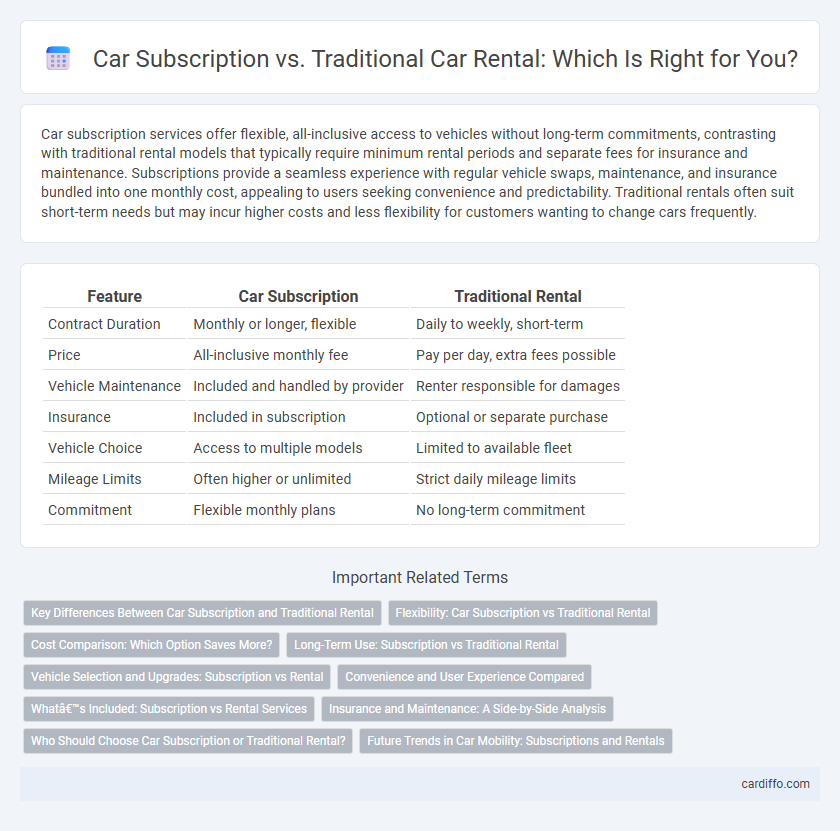Car subscription services offer flexible, all-inclusive access to vehicles without long-term commitments, contrasting with traditional rental models that typically require minimum rental periods and separate fees for insurance and maintenance. Subscriptions provide a seamless experience with regular vehicle swaps, maintenance, and insurance bundled into one monthly cost, appealing to users seeking convenience and predictability. Traditional rentals often suit short-term needs but may incur higher costs and less flexibility for customers wanting to change cars frequently.
Table of Comparison
| Feature | Car Subscription | Traditional Rental |
|---|---|---|
| Contract Duration | Monthly or longer, flexible | Daily to weekly, short-term |
| Price | All-inclusive monthly fee | Pay per day, extra fees possible |
| Vehicle Maintenance | Included and handled by provider | Renter responsible for damages |
| Insurance | Included in subscription | Optional or separate purchase |
| Vehicle Choice | Access to multiple models | Limited to available fleet |
| Mileage Limits | Often higher or unlimited | Strict daily mileage limits |
| Commitment | Flexible monthly plans | No long-term commitment |
Key Differences Between Car Subscription and Traditional Rental
Car subscription services offer flexible, all-inclusive plans that cover insurance, maintenance, and roadside assistance, unlike traditional rentals which typically charge separately for these services. Subscriptions usually allow longer-term use without fixed return dates, providing convenience for users who need vehicles for weeks or months, while traditional rentals focus on short-term, daily or weekly bookings. Pricing models differ as subscriptions have predictable monthly fees, whereas traditional rentals have variable daily rates that can increase with add-ons and penalties.
Flexibility: Car Subscription vs Traditional Rental
Car subscriptions offer greater flexibility by allowing users to switch vehicles, pause memberships, or adjust plans without long-term commitments, unlike traditional rentals that often require fixed rental periods and limited vehicle options. Subscription services typically include maintenance, insurance, and roadside assistance in a flat monthly fee, enhancing convenience compared to traditional rentals where these services may incur additional costs. The flexible terms of car subscriptions cater to dynamic lifestyles, providing a customizable alternative to the rigid structure of traditional rental agreements.
Cost Comparison: Which Option Saves More?
Car subscriptions often include insurance, maintenance, and roadside assistance in a single monthly fee, reducing unexpected expenses compared to traditional car rentals where these costs can add up separately. Traditional rentals may appear cheaper for short-term use but tend to become more expensive over longer durations due to daily rates and extra fees. For budget-conscious consumers seeking convenience and predictability, car subscriptions typically offer better overall cost savings than conventional rental services.
Long-Term Use: Subscription vs Traditional Rental
Car subscription services offer greater flexibility for long-term use compared to traditional rental, often including maintenance, insurance, and vehicle swaps in a single monthly fee. Traditional rental agreements typically require longer commitments or higher costs when extended beyond standard short-term periods. Subscribers benefit from hassle-free vehicle upgrades and predictable expenses, making subscriptions a cost-effective alternative for extended use.
Vehicle Selection and Upgrades: Subscription vs Rental
Car subscription services offer a flexible vehicle selection with access to multiple models within a single plan, allowing users to switch cars based on their needs and preferences. Traditional rentals limit users to one vehicle per rental period, often with fewer upgrade options and a more rigid selection process. Subscription models typically include regular maintenance and insurance, simplifying upgrades and providing a seamless transition between vehicles.
Convenience and User Experience Compared
Car subscription services offer greater convenience through flexible terms, seamless digital platforms, and inclusive maintenance, unlike traditional rental which often involves lengthy paperwork and limited rental periods. Users experience personalized options and easy vehicle swaps with subscriptions, enhancing overall satisfaction and reducing hassle. Traditional rentals may provide lower upfront costs but lack the streamlined, customer-centric design that subscriptions prioritize.
What’s Included: Subscription vs Rental Services
Car subscription services typically include insurance, maintenance, and roadside assistance in a single monthly fee, offering a hassle-free experience with flexible usage terms. Traditional rental services often charge separately for insurance and extra services, leading to variable total costs depending on rental duration and additional add-ons. Subscriptions provide comprehensive package pricing, while rentals focus on short-term needs with customizable options.
Insurance and Maintenance: A Side-by-Side Analysis
Car subscription services typically include comprehensive insurance and regular maintenance within the monthly fee, eliminating the need for separate coverage or unexpected repair costs. Traditional rental agreements often require renters to purchase additional insurance and may not cover maintenance, increasing out-of-pocket expenses and administrative tasks. This integrated approach in subscriptions offers streamlined budgeting and reduced risk compared to the piecemeal expenses of traditional rentals.
Who Should Choose Car Subscription or Traditional Rental?
Car subscription services are ideal for individuals seeking flexibility, access to a variety of vehicles, and inclusive maintenance without long-term commitments, making them suitable for urban professionals and frequent travelers. Traditional car rentals better suit customers needing short-term transportation solutions, often at lower daily costs, such as tourists or those requiring occasional use. Choosing between car subscription and traditional rental depends on usage frequency, budget preferences, and the desire for convenience versus cost-efficiency.
Future Trends in Car Mobility: Subscriptions and Rentals
Car subscriptions are becoming a dominant trend in future car mobility by offering flexible access to vehicles without long-term commitments, contrasting with traditional rentals that emphasize short-term use and fixed rates. Subscription models integrate digital platforms and AI-driven personalization, enabling consumers to switch cars frequently and tailor plans to lifestyle needs, which aligns with growing urbanization and sustainability goals. As automakers and rental companies adopt subscription services, hybrid models blending rental flexibility and subscription convenience will shape the evolving mobility ecosystem.
Car Subscription vs Traditional Rental Infographic

 cardiffo.com
cardiffo.com